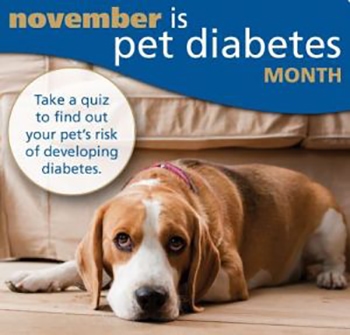Pet Diabetes Month is a nationwide campaign by vets to raise awareness of diabetes in cats and dogs and support the testing of our potentially vulnerable pets for the disease.
Diabetes is a serious and potentially life threatening disease and it is affecting more and more cats and dogs in the UK (1).
It is estimated that today, as many as 1 in 200 pets (2) suffer from the disease. Like human diabetes, pet diabetes is often associated with weight gain and being less active, and older pets are more at risk. Any pet can develop diabetes at any age however some pets are more likely to be affected than others.
It is vital to treat your pet if they have diabetes as if left untreated, it can cause serious illness and even premature death.
The good news is that diabetes can usually be easily diagnosed and once diagnosed, the condition can be managed with appropriate treatment.
During Pet Diabetes Month vet practices across the country are working alongside MSD Animal Health to help make pet owners aware of the risks of sugar diabetes by making free urine glucose tests available for pet owners. These test kits are available in waiting room leaflets.
Could your pet have diabetes?
 Diabetes happens because the body stops making or responding to insulin – a hormone that controls the amount of sugar in the blood. As well as difficulties caused by an inability to turn sugar into energy the body can use, high sugar levels in the blood result in sugar (and lots of water) being passed out in the urine.
Diabetes happens because the body stops making or responding to insulin – a hormone that controls the amount of sugar in the blood. As well as difficulties caused by an inability to turn sugar into energy the body can use, high sugar levels in the blood result in sugar (and lots of water) being passed out in the urine.
While that’s bad news for the body, it’s good news for diabetes diagnosis as a simple dipstick test like the one available to pet owners FREE as part of this campaign, can show up if there is sugar present in a pet’s urine. With rare exceptions, the presence of any sugar in the urine of a cat or dog means they are likely to have diabetes.
If your pet is at risk, get in touch with your veterinary practice and have your pet tested for diabetes.
Why early diagnosis is vital
Like all illnesses, the earlier the problem is diagnosed and treated, the better. Unfortunately, your pet can’t tell you how they’re feeling and sadly, as diabetes is an under-diagnosed disease, we know there are pets out there suffering in silence from the condition.
References:
- Diabetes global market research – July 2013, UK – Merck
- Panciera DL, Thomas CB, Eicker SW, Atkins CE. Epizootiologic patterns of diabetes mellitus in cats: 333 cases (1980–1986). J Am Vet Med Assoc.1990;197(11):1504–1508.




